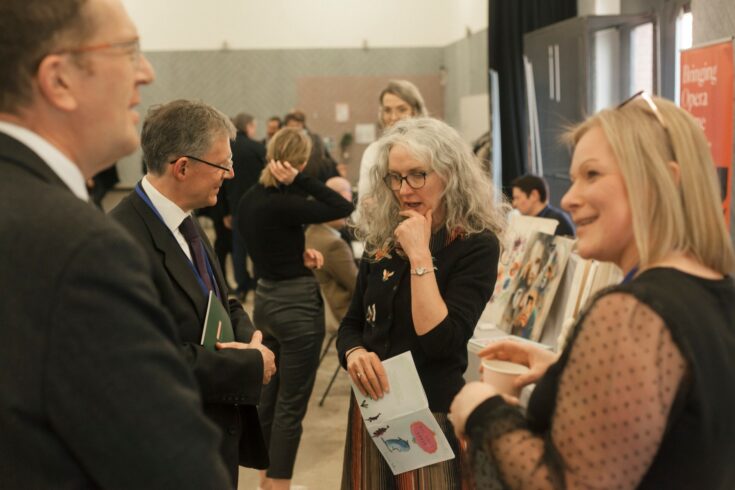As a funder of arts and humanities research across the whole of the UK, I am keen that we know and engage with our communities, partners and research ecosystems, wherever they are.
That’s why our engagement programme is taking us across the whole of the UK.
Last month, an Arts and Humanities Research Council (AHRC) delegation travelled to Belfast for our Council meeting and were fortunate to visit Queen’s University Belfast, Ulster University, the Ormeau Baths and Future Screens Northern Ireland.
We also met with the Arts Council Northern Ireland and hosted an international roundtable to hear from researchers and project partners involved in AHRC-funded international projects and enable them to understand the scope of current international collaboration.
Across two days of insightful and exciting engagement, the themes that stood out most to me were those of regeneration and revival.
Belfast is both an example of communities and individuals recovering from a difficult past, and one from which we should all learn, but it’s also a place to learn hope and to see the role for arts and humanities in building communities and better futures.
The creative industries: a success story
The creative industries are key to the UK’s prosperity, wellbeing and resilience.
They provide high-quality employment, drive innovation and help address some of society’s most-pressing challenges, and research and innovation are crucial for such a fast-growing and important sector.
We saw this firsthand from Future Screens Northern Ireland – one of AHRC’s Creative Industries Clusters and a huge success story in Belfast.
At its inception, Future Screens set out to deliver expert technical skills, opportunity and growth across film, broadcast and animation.
But in five years they have delivered well beyond this. The programme has pioneered ground-breaking technology, products and services, as well as the talent to deliver them.
We were treated to a showcase of some of the small and medium-sized enterprises Future Screens have collaborated with.
The range of technology and creativity was especially clearly visible in those who were tackling issues such as education, grief, sports concussion and tourism – and we saw only eight of the over 120 projects which they have spun out:
- TapSOS: a non-verbal app that allows individuals to report an emergency without speaking. This might be due to being deaf, hard of hearing or non-verbal, unable to speak due to a medical emergency or needing help discreetly without alerting an attacker
- Retinize: one of Europe’s fast-growing immersive-technology studios working across augmented and virtual reality, multi-screen installations and software development to create immersive experiences for major brands
- Yellow Design: using augmented reality to create immersive tourist experiences
- Little Forget Me Nots: charity that supports families experiencing pre-teen child loss, via peer craft sessions and access to funded art therapy
- Ulster Touring Opera: Don Giovanni recreated in augmented reality to produce an immersive opera experience for audiences to participate in via their smart phones
- INCISIV: using virtual reality to better understand how the brain makes decisions under pressure during sports and to accelerate rehabilitation and recovery after injury
- Armchair & Rocket: using groundbreaking artificial intelligence processes to create new opportunities in entertainment, education and advertising
- Future Foundations: a mentoring programme which aims to match experienced practitioners to artists and creative freelancers who request help and support
Together, they have redefined the way in which industry and researchers can collaborate to develop new products and experiences across the creative sector and beyond, delivering new jobs and a £400 million increase in gross value added to boost the local economy.
Participation and growth
AHRC is committed to its work on, and investment in, the creative economy, regional growth and community regeneration. And we know that community is hugely important in Northern Ireland.
As part of our visit to Future Screens, we were hosted at the Ormeau Baths.
Built in 1888 to provide a neutral space for the community – many of whom at that time didn’t have kitchens, showers, baths or even access to hot water – this incredible building is proud to be once again a place for the community to come together and thrive in a co-working space.
At our Council meeting we had a presentation from AHRC Programme Director Katy Shaw, whose Creative Communities project turns a corner for our investment this area.
By championing the role of communities and making clear recommendations for improved coherence in our funding, this project will set a new standard for our purposeful engagement with communities. Katy also took the opportunity to meet Northern Ireland leaders and representatives to develop her findings.
As we’ve already seen, Future Screens Northern Ireland has developed a definition of, and a working model for the creative industries in Northern Ireland which is focused on participation, cultural and economic growth, and social and economic regeneration, placing the partnership as a leading developmental catalyst in this Northern Ireland sector.
The necessity of art in life
Also at the forefront of the visit, was our connection to regeneration and renewal in terms of what’s personal.
We had a very moving presentation at Council from Professor Gerard Leavy and Ken Grant of Ulster University.
Their project, Challenging Health Outcomes and Integrating Care Environments: a community consortium to tackle health disparities for people living with mental illness, is part of AHRC’s programme on Mobilising Community Assets to Tackle Health Disparities.
Part of the project looks at helping people with physical and mental health challenges use photography to navigate their world. One of the researchers spoke movingly of working in ‘the studio of people’s lives’, which has stayed with me.
Many of us were moved, too, by the presentation from charity Little Forget Me Nots whose use of craft as therapy for bereaved families not only provides an essential societal service but also perfectly illustrates the simple necessity of art in life.
New futures
I am looking forward to continuing collaborations in Northern Ireland and across the UK.
Just recently, Jaideep Gupte unveiled our proposals for funding research in law and social justice at the Socio-Legal Studies Association annual meeting in Ulster University.
Our next Council meeting will be in Glasgow. And we will actively look for opportunities to meet and discuss our work with you, in person, whilst doing our best to travel sustainably and take advantage of our hybrid world.
Our strategic delivery plan promises that AHRC will be a better funder – and we can only do that by working with you and by looking to fund where and in ways in which we can build towards a better future.




